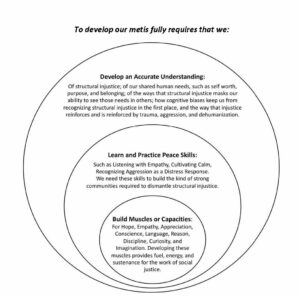Phronesis is from the Greek, often translated as practical wisdom. A lab organized around phronesis is one where ideas such as “peace,” “social justice” and “civic engagement” are examined in practical context – how are these ideas employed in our day-to-day activities? How might we test these ideas? While our tests don’t involve formal experimentation, we often make use of experimental data, and any other tools we find useful.
Another Greek word metis guides our methodology. Metis can mean good decisions, effective actions, discernment, forethought, skill, awareness, wisdom, and courage. However, we need to recognize that metis comes in degrees. The diagram below depicts all the components of metis that must come together if we are to solve the root causes of problems and promote peace, justice, and all forms of wellbeing. Phronesis or practical wisdom is the fullest form of metis.

Just as language is a faculty that can be developed and strengthened—similar to a muscle—hope, empathy, appreciation, conscience, reason, discipline, curiosity, and imagination are also faculties that can be developed and strengthened. These metaphorical muscles, along with peace literacy skills and accurate understanding, are areas of potential growth. Our research in Peace Literacy, is designed to help growth in these three areas, ratcheting up the metis needed to navigate a world of increasing technological complexity.
Our Principles: Work supported by the Lab is organized around principles that are methodological, rather than disciplinary. Modeled after the work of scholars such as Richard Rorty, Michel Foucault, and Angela Davis, our principles can be divided into three inter-related themes:
- Contingency Our projects critically investigate and make explicit the largely implicit assumptions guiding scientific research, public policy, and social practices more broadly. We are interested in tracing a genealogical path, from the particular problems that catch people’s attention, to the methods they use to solve the problem, and finally to the explanatory conclusions they reach, and the way these conclusions are framed. We critically examine the implicit pragmatic considerations—whether they be financial, practical, historical, cultural—that constrain or direct the range of options available at each decision point. We show how decisions that seem natural or necessary are in fact contingent, relying on a number of assumptions, not all of which stand up to critical evaluation.
- Irony We strive to have an ironic, self-reflexive stance, recognizing that our own work is contingent, and our conclusions fallible. For these reasons we frame our work in terms of hypotheses, and we frame our research in terms of evidence gathering in support of those hypotheses. If our hypotheses have weak support we try to revise them. Even our evaluative, ethical prescriptions can be better or worse supported by evidence, broadly construed. While we often make use of evidence produced in formal experimental settings, we also appeal to evidence produced from more informal engagement with the real world. Engaging with the ambiguities in practical real-world settings and recognizing the contingency of our own evaluations—these are skills we try to model.
- Solidarity The pragmatic considerations on which we focus our critical evaluations—the financial, practical, historical, and cultural contingencies we examine in science, policy, and society—invariably reveal benefits to some and costs to others. More often than not, the moral calculus at work is calibrated unjustly according to arbitrary social markers such as gender, ethnicity, national background, dis/ability, and social/economic status. We focus our work in solidarity with those struggling against these kinds of social injustice.

